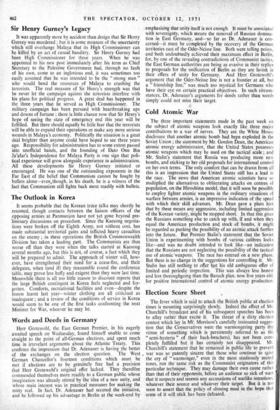Cold Atomic War
The three important statements made in the past week on the subject of atomic weapons look exactly like three major contributions to a war of nerves. They are_ the White House disclosure that another atomic bomb had bejn exploded in the Soviet Union ; the statement by Mr. Gordon Dean, the American atomic energy administrator, that the United States _ possesses -atomic weapons which may be used on the tactical scale ; and Mr. Stalin's statement that Russia was producing more new bombs, and sticking to her old proposals for international control on her own terms. The only comfort that can be drawn from all this is an impression that the United States still has a lead in the race. The news that American atomic scientists have so multiplied the alternatives to obliterating attacks on centres, of population, on the Hiroshima model, that it will soon be possible to employ lighter atomic weapons in the ordinary situations of warfare \between armies, is an impressive indication of the speed with which their skill advances. Mr. Dean gave a plain hint that by these means any aggression, including limited aggression of the Korean variety, might be stopped short. In that this gives the Russians something else to catch up with, if and when they equal the American production and stock of bombs, it might be regarded as pushing the possibility of an atomic attack further into the future. But Premier Stalin's statement that the Soviet Union is experimenting with bombs of. various calibres looks like—and was no doubt intended to look like—an indication that the Russians are not neglecting the possibility of the tactical use of atomic 'weapons. The race has entered on a new phase. But there is no change in the suggestions for controlling, it. Mr. Stalin has still nothing to offer hut his old ambiguous offer of limited -and periodic inspection. This was always less honest and less thoroughgoing than the Baruch plan, now five years old, for positive international control of atomic energy production.


































 Previous page
Previous page